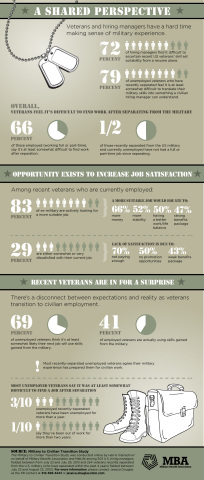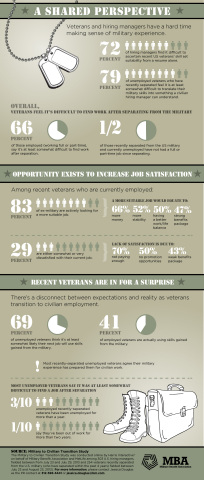CHANTILLY, Va.--(BUSINESS WIRE)--Veterans have a hard time telling their story and hiring managers have a difficult time interpreting it, according to a new survey released today from the Military Benefit Association, with support from MetLife. The results shine a spotlight on the challenges new veterans face when transitioning from the armed forces to civilian employment. Data from the new survey also demonstrates an opportunity for companies hiring new veterans to increase job satisfaction.
The national surveys were conducted online by Harris Interactive© - among more than 300 hiring managers across industries and company sizes from July 23 to July 29, 2013 and among more than 250 recently separated veterans from July 23 to August 23, 2013.
“Our nation’s heroes deserve a hero’s welcome into civilian employment,” said retired U.S. Air Force Senior Master Sgt. Roy Gibson, President of Military Benefit Association. “However, while there is substantial training available to military personnel months before they separate, service members still face many struggles as they make the transition to the civilian sector.”
Hiring Managers & Veterans: A Shared Perspective
Seventy-nine percent of unemployed veterans that have recently separated and have applied and/or interviewed for jobs feel it is at least somewhat difficult to translate their military skills into something a civilian hiring manager can relate to. Further, 72 percent of hiring managers say they also find it at least somewhat difficult to ascertain recent veterans’ skill set suitability just from their resume alone.
Among new veterans that are employed (working full- or part-time), two-thirds say it was at least somewhat difficult to find work after separation.
New Veterans Meet Surprises in Civilian Employment
Frustration extends beyond translating military experience into civilian employment. There is a clear disconnect between veterans’ expectations for post-military life and the reality they meet. More than two-thirds (69 percent) of unemployed veterans feel it is at least somewhat likely that they’ll use military-related skills in their next job. In reality, 59 percent of working veterans say they do not use their military experience at work.
Finding civilian work post-separation is not immediate and poses unemployment challenges:
- Half of those recently separated from the US military and currently unemployed have not had a full- or part-time job since detaching;
- Among those unemployed, 31 percent have been unemployed for up to three months;
- Forty percent of unemployed veterans have been out of work for 4-12 months;
- Three in 10 unemployed veterans who have recently separated have been out of work for more than one year; with
- Roughly one in 10 (13 percent) having been out of work for more than two years.
Job Dissatisfaction in Civilian Employment
Among new veterans currently employed, a large opportunity exists to increase job satisfaction. Eighty-three percent of new veterans who are in their first job since separating and took something temporary are looking for a more suitable job. Veterans say a better job means:
- Making more money (66 percent)
- Better job stability (52 percent)
- A better work/life balance (50 percent)
- Promotion opportunities (48 percent)
- A strong benefits package (47 percent)
Addressing the Problem
The Military Benefit Association believes soon-to-be veterans should take advantage of organizations built around supporting transition into civilian life and beyond. While the Military Benefit Association works to ensure veterans’ financial futures, organizations like American Corporate Partners, for example - which pairs ex-military members with corporate mentors based on career objectives and professional experience to help with the transition to the private sector - can also be of value to soon-to-be veterans. As active duty military transition to civilian life, the Military Benefit Association also recommends veterans work with a professional, or even a seasoned civilian, to create a strong resume and practice interviewing.
“Given the challenges they face, it’s clear our country’s heroes need to begin thinking and acting like veterans well before they leave active duty,” added Gibson. “For example, during the transition from active duty, someone who has a specialty skill in repairing jet engines should think of themselves more broadly as a mechanic instead of simply an aircraft technician.”
Methodology
The Military to Civilian Transition Study was conducted online by Harris Interactive© on behalf of Military Benefit Association among 303 U.S. hiring managers, fielded between from July 23 and July 29, 2013 and 254 veterans recently separated from the U.S. military (who have separated within the past 4 years) fielded between July 23 and August 23, 2013.
About Military Benefit Association
Military Benefit Association was founded in 1956 by military personnel to help advance and safeguard the economic interests and financial welfare of military members and their families. One of the oldest and largest associations of its kind, Military Benefit Association operates as a non-profit association to sponsor insurance and other valuable benefits to the military and federal civilian communities.
About MetLife
MetLife, Inc. is a leading global provider of insurance, annuities and employee benefit programs, serving 90 million customers. Through its subsidiaries and affiliates, MetLife holds leading market positions in the United States, Japan, Latin America, Asia, Europe and the Middle East. For more information, visit www.metlife.com.




